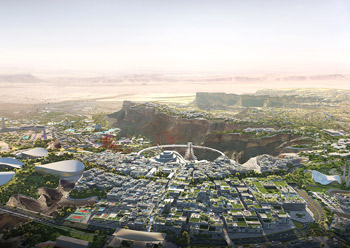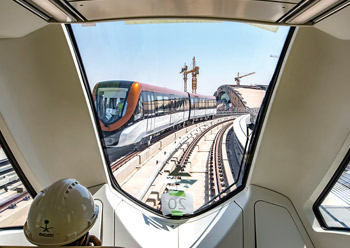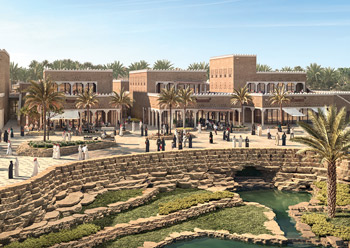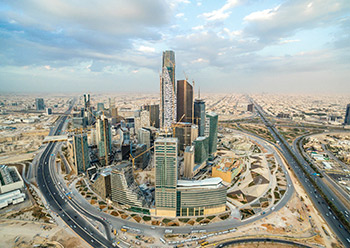
 Line 3 ... test run in UTO mode at the Western Station.
Line 3 ... test run in UTO mode at the Western Station.
Work on what is described as the world’s largest single-phase metro construction project is nearing completion in Riyadh with operations due to commence by the end of this year.
The $27-billion Riyadh Metro and Bus project was originally conceptualised for development over 25 years. However, Riyadh’s population growth and the boom in car ownership and the subsequent severe traffic congestion meant that the city planners committed to bringing the timescale forward to tackle these issues and decided to put in place the Saudi capital city’s ambitious public transit network in a single phase.
The Riyadh Metro network consists of six lines with a length of 176 km, designed to high technical and design specifications and uses an automated train system (driverless). It also comprises 85 main and secondary stations – including four iconic stations at King Abdullah Financial District (KAFD), Olaya, Western Station and Qasr Al Hokm Downtown – and seven depots and maintenance centres.
 |
|
Line Two train run at Riyadh Exhibition Centre Station. |
The Riyadh Bus network, meanwhile, includes 24 lines extending over 1,900 km. The two networks complement each other, meeting all existing and expected mobility requirements for the city, providing a modern, safe and fast transportation service.
The transport network, which is now targeted to see both the metro and bus components operational by the end of 2021, will contribute in transforming Riyadh into one of the most liveable cities in the world, a vital strategic pillar of the Saudi Vision 2030 plan, according to the Royal Commission for Riyadh City (RCRC) – previously known as the Arriyadh Development Authority (ADA) – which is spearheading the development of the project.
At the recent Future Investment Initiative (FII) conference, held in Riyadh on January 27 this year, the CEO of the Royal Commission for Riyadh City, HE Fahd Al-Rasheed, announced that the Riyadh Metro would commence operations on part of the network in the third quarter of 2021. The first stage of the Riyadh Bus network will precede the metro launch, starting operations earlier in the year.
Following the initial start of operations, the bus network will be regularly expanded to include the launch of the Bus Rapid Transit (BRT) network, and further openings of metro lines, even as the development of additional lines and extensions to the network are already under way.
The construction of Riyadh Metro has been undertaken by three international design-build consortia (DBs). The contract awards in 2013 launched a mass mobilisation of resources, technologies and talent to and within Saudi Arabia on a scale never before seen on a single project in the country, and which has formed a backdrop to daily life in Riyadh in the seven years since.
 |
|
Line One South Depot stabling building. |
The three consortia are: BACS, responsible for Lines One and Two (contract value $10.1 billion); ArRiyadh New Mobility (ANM) for Line Three (contract value $6.85 billion) and FAST for Lines Four, Five and Six (contract value $7.9 billion). Each consortium is arranged with contractors specialised in complementary metro design and construction disciplines including tunnelling, viaducts, track works, operations and control systems, electrical and mechanical works, design, project management and rolling stock.
Riyadh Metro Transit Consultants (RMTC) was selected to provide project management and construction management (PMCM) services for Lines One, Two and Three (Packages One and Two) of the project; while Riyadh Advanced Metro Project Execution and Delivery (Ramped) is responsible for the PMCM on Lines Four, Five and Six (Package Three).
Package One of the PMCM programme has progressed significantly, according to Alexander Jounard, Manager, Package One, RMTC.
The Olaya-Batha’a Corridor (OBC) on Line One progressed rapidly from close out of design to completion and opening to traffic, with 47 km of road improvement completed by the end of 2020. All 67 of the Siemens Inspiro train sets (41 four-car for Line One, 26 two-car for Line Two) are reported to have now arrived in Riyadh where they will be tested and commissioned, ready for service. Line Two has completed end-to-end test runs in UTO (unattended train operation) mode.
Other milestones include energisation of all passage posts and the installation of roof panels at the iconic King Abdullah Financial District (KAFD) Station, and the completion of diagrid glazing and GRG (glass reinforced gypsum) installation.
 |
|
The iconic KAFD Station ... diagrid glazing, GRG and roof panels installation complete. |
The 41.6-km Line Three – the longest line on the Riyadh Metro network – also made considerable headway last year, says Laurent Banlin, RMTC Deputy Project Director and Manager, Package Two. The line is now fully operational from the Operations Control Centre (OCC), and achieved an end-to-end test run in UTO mode from the western end to the eastern end. Train Dynamic System Acceptance Testing was completed last year, as were all transit systems installations. Thirty of the Bombardier Innovia Metro 300 train sets – out of the total of 47 for the line – have been fully tested and commissioned.
Landscaping and highway improvement have also progressed, with 300,000 sq m of asphalt laid, as well as 530 car-parking spaces and 133,000 sq m of pavement interlocks installed, to improve the pedestrian environment and accessibility to the system. Around 1,500 light poles have been installed, with 1,700 further pieces of street furniture added. Package Two also achieved 41 million manhours without a Lost Time Incident (LTI).
Meanwhile, work is in progress on the depots, stations and landscaping of Lines Four, Five and Six that make up Package Three, which is managed by Ramped. Chris Gilmore, Construction Director, explains that major equipment has been installed and commissioned for Lines Four and Six depots, and stabling lines brought to operational use, which has facilitated the operation of Line Four in carousel running, ultimately to simulate the timetable for the line. Line Four has also seen work progress at the two additional airport stations (T1-2 and T3-4) with link bridges installed.
Line Five – the only line on the Riyadh network that is entirely underground – has now seen all station entrance canopies installed, while architectural fit-out for the northern stations at Line Six is completed.
In line with the advanced stage of the project, landscaping and planting has commenced across all three lines in the package, whilst, at the same time, over 100 km of temporary traffic control barriers have been removed, Gilmore adds.
.jpg) |
|
Test run on Lines Four and Six. |
In line with the project’s commitment to safety, Package Three saw over 26 million work hours without a single LTI, he states.
The operation and maintenance of the metro will be handled by two consortia:
• Lines One and Two will be operated by Camco, which sees the French multi-modal operator RATP Dev joining forces with Saudi Arabia’s Saptco;
• Lines Three, Four, Five and Six will be operated by FLOW, which brings together Italian infrastructure and operator Ferrovie dello Stato Italiane, Japan’s Hitachi and Alstom of France. FLOW has been actively engaged on site for familiarisation, and in preparation for the trial run phase and handover process planning.
Operation and maintenance staff (mostly Saudi nationals) continued mobilisation during 2020 and training on site, which includes familiarisation with equipment, railway systems and rolling stock, safety procedures, operating rules, and maintenance activities.
Simultaneously, system demonstration tests are ongoing before the planned start of trial runs and interfaces with all stakeholders and authorities are being finalised.
Stations & rolling stock
The stations and rolling stock have been designed in keeping with international design standards for a mass transit system – albeit with a flavour unique to Riyadh City – that will facilitate rapid transit between stations, and efficient access and egress into and out of the stations.
The rolling stock has three classes (Gold, Single and Family) of travel, while the overall design of the Riyadh Bus and Riyadh Metro network will appeal to all users, irrespective of background, nationality, or reason to travel. Through-ticketing, across multiple fare media channels, will enable the newly arrived tourist to travel as easily as the ‘seasoned’ commuter, according to the metro authorities.
Challenges
Constructing a new metro network from scratch in the hot, harsh and dusty environment of Riyadh undoubtedly presents major challenges – not all of which could be pre-empted, according to the PMCM teams.
Among these challenges were working with concrete in the summer temperatures especially. This included ensuring the tunnel segments did not crack due to the outside of blocks drying too quickly during the curing process.
Lindsay Vamplew, Project Director, Ramped, explains how this problem was overcome in a recent interview with International Rail Journal (IRJ): “This was done by simply covering the top of the concrete so it didn’t dry out too quickly; the outside remained damp and the curing process was slowed which spread out the internal stresses throughout the block.”
An unexpected challenge came about when tunnelling proceeded so well that tunnel boring machines (TBMs) reached some stations before the station box had been excavated. Ramped decided to proceed with tunnelling and stay ahead of schedule by excavating the box around the tunnel.
Vamplew explains: “We had to keep a constant load on some of the segments to prevent failure. We developed a method where we were able to strengthen the tunnel at the location of the box excavation and maintain constant loading across the box. It proved so successful, we shared the technique with our colleagues at BACS (Package One) who had a similar issue.”
Carter Rohan, Project Director, RMTC, has also experienced his fair share of challenges, given some of the structures he has had to protect during construction, included the historic Red Palace, and some of Riyadh’s tallest and most recognisable structures along Olaya Street. One of the challenges that he and his team are most proud of meeting was the relocation of one of Riyadh’s largest water mains in the east of the city, which supplies 25 per cent of the city’s residents with potable water. As it crossed the path of Line Two at a congested underpass, it was estimated it would take up to 20 days to complete the work. However, the water company Saline Water Conversion Company (SWCC) advised that back-up tanks only had a capacity of 10 days.
The team analysed the situation and implemented several time-saving initiatives, such as adjustments to design; prefabrication of some elements such as rebar cages and connection collars; installation of a diversionary pipe; and the design and use of a catchment basin to collect relief water. This was not normal practice and carried a degree of risk.
“After the prep work was done and the diversion pipe was in place, we began the connection work with the diversion teams working around the clock,” says Rohan in the interview with IRJ. “We were very successful, completing the work in six days with no disruption to the public water supply.”
Both Rohan and Vamplew agree that working collaboratively as a PMCM team was vital to being able to deliver a project of this scale and complexity.
As the metro and bus network becomes part of the fabric of Riyadh life, the management company responsible for overseeing the day-to-day operation and long-term strategic development of the network will continue to seek out suitable partnerships with commercial entities and other third parties to bring value-added services and benefits to users of the system.
Constructing a network that went from zero to automatic testing of trains in just five years is impressive indeed. This is a network that will change the way citizens view mobility in the metropolis, and pave the way for expansion of the urban transport sector throughout the kingdom.








.jpg)




.jpg)




























.jpg)




































